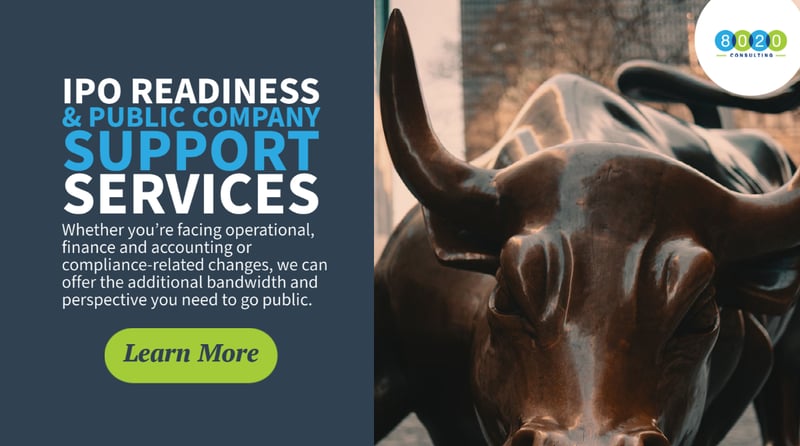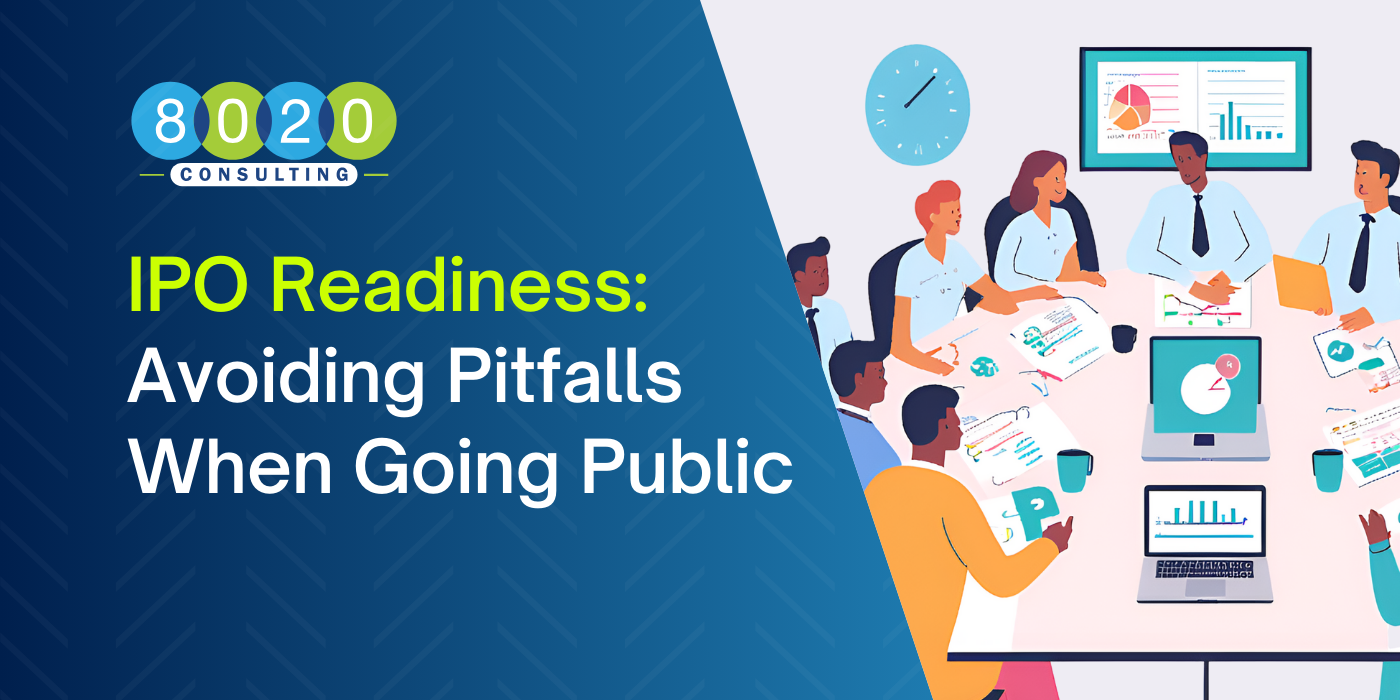Initial public offerings can be downright brutal. Very little will put a company under as much stress or cause as much disruption as the “all hands on deck” push toward an IPO. While we won’t go so far as to promise business as usual during the IPO process, there are some things a company can do to ease burdens and ensure a much smoother transition. Based on my experiences as IPO readiness consulting veteran on the IPO front lines, let’s explore key questions, walk through some IPO dos and don’ts, and cover items to consider when contemplating or already embarking upon the move from private to public.
|
Key Takeaways
|
Table of Contents
- Strategic Considerations
- Operational Readiness
- Personnel and Team Management
- Timeline and Process
- External Support
- Next Steps
1. Strategic Considerations
The Fundamental Question: Are We Really Ready?
The decision to go public shouldn't be an easy one. This is the time for serious corporate introspection. Taking a long, hard look at your company and evaluating what you see as honestly and objectively as possible is crucial before proceeding with any IPO moves.
Market Viability
Before moving forward, consider these essential questions about your market position:
- Are you offering a growth product or service that can command the public's attention, tap into the prevailing zeitgeist, or act as a disruptor?
- If you're not offering a one-of-a-kind product or service, can you differentiate yourself effectively enough to stand out within a competitive marketplace?
Your product or service doesn't have to resonate with the public as dramatically as the iPhone, but you do need to feel confident that investors will gravitate toward what you are providing.
Exploring Alternatives
Consider these critical questions before committing to an IPO:
- Is an outright sale a better option than an IPO?
- Are you simply trying to cash out a few investors?
- Will an IPO be cost effective? Do you stand to gain more than the costs associated with going and staying public?
A dual-track process might be right for some companies, allowing them to start down the IPO track while still "shopping themselves around" for a private equity exit. Private equity offers will still be subject to due diligence, so time and effort won't be wasted even if the work doesn't result in an IPO.
2. Operational Readiness
Preparing for Increased Scrutiny
Taking a company public leaves you with no place to hide. Consider these operational requirements:
- Are you adequately prepared for more rigorous and more frequent reporting requirements?
- Are your books in order, or are there too many loose ends and skeletons in the closet?
- Is your ERP system set up to see you successfully through the IPO process?
- Are your budgeting tools robust enough to deliver all that an IPO requires?
- Are all needed internal controls in place?
- Are your systems and tools integrated across entities, states, or countries?
Audit Considerations
During the IPO process, transparency with auditors becomes paramount. Issues that once might have been swept under the rug may now loom large. IPO preparation often requires bringing in a new "Big 4" auditor, who will likely review prior audits with increased scrutiny given the added risks of rendering an IPO-related opinion.
3. Personnel and Team Management
Building the Right Team
The IPO process will have everyone from C-suite leaders to support staff firing on all cylinders. Additional team members will likely need to be brought on board, particularly considering the detailed requirements of the S-1 filing.
Maintaining Motivation
To keep your team motivated, consider implementing:
- Performance bonuses
- Stock options
- Extra vacation time
- Recognition programs for hard work
- Regular communication through weekly meetings
- Clear prioritization of IPO-related tasks
Preserving Business Operations
CEOs and CFOs should be conscious of becoming so distracted that company management and development suffer. Establish and maintain dedicated time for running the business to ensure the growth that made your IPO possible doesn't start to sputter.
Want to learn more about how to drive a successful IPO? Read our blog post: “Three Ways IPO CFOs Can Drive Success.”
4. Timeline and Process
Setting Realistic Expectations
The journey to an IPO requires careful timeline planning and process management. While some companies might be tempted to accelerate the process, rushing through preparation stages often leads to complications and potential failures. A well-structured timeline typically includes:
Pre-IPO Phase (6-12 months)
The initial phase of the IPO journey begins with a comprehensive readiness assessment and gap analysis to identify areas requiring attention. During this period, companies typically form their IPO working group and steering committee, which will guide the entire process. This phase also involves selecting underwriters and external advisors who will play crucial roles in the offering. Companies must implement required financial systems and controls, while simultaneously beginning the intensive process of financial statement preparation and audit procedures.
IPO Preparation Phase (6-12 months)
As preparation intensifies, focus shifts to developing and refining the S-1 registration statement, the cornerstone document of the IPO process. Companies must implement robust corporate governance structures and create a comprehensive investor relations framework to prepare for life as a public company. This phase includes establishing public company policies and procedures, conducting employee training on public company requirements, and running test scenarios of accelerated financial closing processes to ensure readiness for quarterly reporting demands.
Critical Timing Considerations
While a minimum preparation window of 12 months is necessary, most companies benefit from an 18-24 month timeline to ensure thorough preparation. The timing must account for market conditions, seasonal factors specific to your industry, regulatory review periods, and mandatory quiet period requirements. This extended timeline allows companies to navigate the complex regulatory landscape while maintaining operational excellence.
Common Timeline Challenges
Companies frequently encounter various challenges that can impact their IPO timeline. Unexpected regulatory changes and market volatility can force adjustments to the schedule, while government shutdowns or delays can pause progress entirely. The integration of new systems and processes often takes longer than anticipated, and extended auditor review periods are common. Additionally, key personnel changes and shifts in the competitive landscape may necessitate strategic adjustments during the process.
Want to explore how we can help? Visit our IPO Readiness & Public Company Support page.
5. External Support
Building Your IPO Team
A successful IPO requires a comprehensive team of external advisors working in concert with your internal staff. Each plays a crucial role in the IPO process:
Investment Banks and Underwriters
Investment banks play a pivotal role in leading the offering process and developing the pricing strategy. They provide crucial market insights and timing recommendations that can significantly impact the IPO's success. These institutions help structure the offering, coordinate essential road shows and investor presentations, manage the syndicate of banks, and provide ongoing support for post-IPO market making and research coverage. Their expertise in navigating market conditions and investor sentiment is invaluable throughout the process.
Legal Counsel
Legal advisors are essential partners in guiding regulatory compliance and managing SEC filings. They help structure corporate governance frameworks and take the lead in drafting and reviewing offering documents. Beyond the core IPO work, legal counsel manages intellectual property matters, addresses employment and compensation issues, and helps navigate the complex landscape of disclosure requirements. Their role is critical in ensuring the company meets all regulatory requirements while protecting its interests.
Independent Auditors
The role of independent auditors extends far beyond traditional financial statement audits. They conduct thorough reviews of internal controls, provide essential comfort letters, and address complex accounting matters that arise during the IPO process. Auditors also play a crucial role in supporting responses to SEC comments and providing guidance on technical accounting decisions. Their work helps establish the credibility and reliability of the company's financial reporting.
IPO Consultants
IPO consultants serve as an extension of your team, bringing fresh perspective and objective evaluation to the process. They provide technical accounting expertise and project management oversight while training in-house staff on new requirements. These professionals develop new reporting models, facilitate communication between the company and auditors, and conduct comprehensive IPO readiness assessments. They also offer valuable process improvement recommendations, change management support, and post-IPO transition planning, helping ensure a smooth transformation from private to public status.
Specialist Advisors
A successful IPO requires support from various specialist advisors who bring focused expertise to specific aspects of the process. Tax advisors help with structural planning and optimization, while compensation consultants design appropriate equity plans for the public company environment. IT specialists ensure systems are upgraded to meet public company requirements, and investor relations firms help prepare for ongoing communication with the market. Public relations agencies manage the company's public image, while transfer agents and financial printers handle crucial operational aspects of the offering.
Coordinating Your External Team
The success of an IPO largely depends on effective coordination among all these external parties. Companies must establish clear roles and responsibilities while maintaining comprehensive project timelines. Regular coordination meetings help ensure all teams are aligned, while central document repositories facilitate efficient information sharing. Clear communication protocols, careful progress monitoring, and effective management of competing priorities are essential for keeping the IPO process on track. This coordinated approach helps ensure that each advisor's expertise is fully leveraged while maintaining momentum toward the IPO goal.
While external support won't eliminate all IPO pressures, a well-coordinated team of advisors can ensure you have the expertise needed to navigate the complex IPO process while keeping your business healthy and moving forward.
6. Next Steps
Going public isn't for the faint of heart. It entails both pre- and post-IPO costs and is labor intensive and time consuming. Without careful preparation and able stewardship, companies risk squandering financial and human resources in a failed IPO attempt. However, an expertly managed IPO process can be as exhilarating as it is exhausting, heralding a new chapter in a company's development and bringing the satisfaction of a tough job well done to all involved.
Is your company thinking about an IPO or getting bogged down by the process? Our IPO specialists would be happy to help. You can contact 8020 Consulting here, call us anytime at 855.367.8020, or click the button below to learn more about our services.

About the Author
Brandon is a finance and accounting specialist with more than 20 years of experience. His career started as an auditor with the “Big 4” assisting and leading audit engagements in a wide range of industries including consumer products, financial services, and biotechnology. He then went on to The Walt Disney Company’s Transaction Support team where he was responsible for providing expertise in M&A and due diligence, divestiture, technical accounting, and restructuring to Disney and all of its subsidiaries. After The Walt Disney Company, Brandon led year-end audits, month-end close, and financial reporting in the retail apparel industry at levels of Senior Manager and then Director. Brandon is a CPA and holds a Bachelor of Science in accounting with a minor in economics from the University of Massachusetts Amherst.
